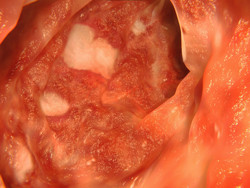Protein misfolding and bacterial toxicity
Threatening the health status of patients with an already weakened immune system, Klebsiella oxytoca is a frequent visitor in intensive and elderly care units. Multi-drug resistant strains of Klebsiella are highly virulent and spread rapidly. Membrane proteins are the key to Klebsiella's success in the infection stakes. One in particular, PulD is crucial to the survival and infectivity of the bacterium. An outer membrane protein, it is part of the machinery for the pore structures. These are vital for the secretion of enzymes, virulence factors (including toxins) and for the assembly of surface pili or hair-like structures. The FAPUL project has demonstrated the importance of protein folding in the pathway to functionality. A protein will undergo many structural changes during its assembly and folding can be an integral part of its function. The resulting shape is key in terms of interaction with other molecules. FAPUL researchers showed that PulD protein is part of a multi-step process kicked off by the association of monomers (single unit molecules) with the membrane. An intermediate molecule tightly associated with the membrane was identified as a pre-pore structure that will undergo changes to become the native mature pore. When the scientists analysed the protein structure, results indicated that there is a switch in conformation or structure to attain the native pore status. To help with the analysis, they developed a mutant library to identify folding intermediates. The exact mechanism is likely to involve interdomain communication to initiate the necessary conformational change. FAPUL research has provided a firm knowledge base for future research on membrane proteins. Results represent the first step in identification of specific sites for targeted drug action. In the present climate of microbial multi-drug resistance, development of new antimicrobials is crucial to disarm pathogenic bacteria.
Keywords
Protein, bacterium, multi-drug resistant, Klebsiella oxytoca, PulD, infectivity, toxins, folding, antimicrobials

